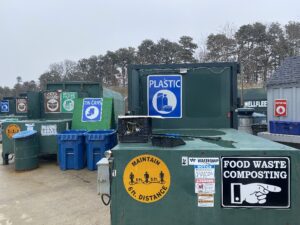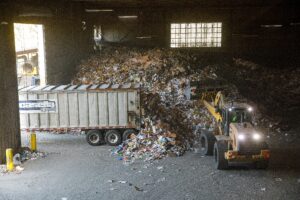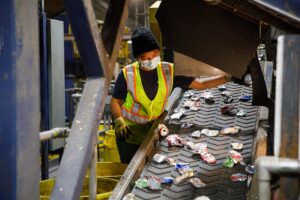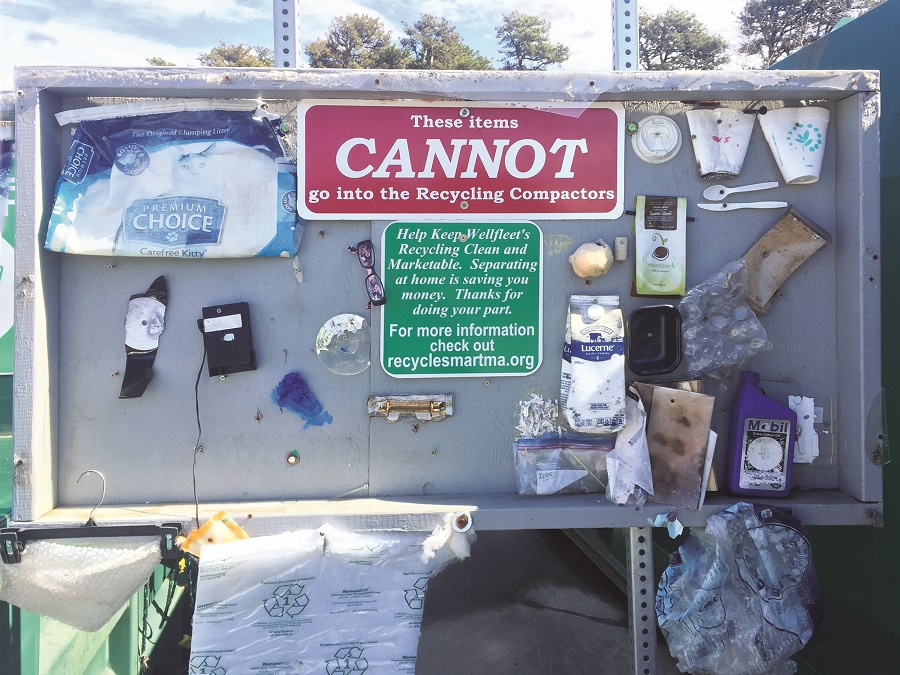WELLFLEET — If there’s one thing Cape Codders can be proud of, it’s being good recyclers. That’s according to Kari Parcell, whose job is to be picky. Parcell is the waste reduction coordinator for Barnstable County Cape Cod Cooperative Extension.

The contamination rate in recycling streams across the country is around 25 percent, according to the National Waste & Recycling Association. But a 2022 waste audit in Wellfleet found contamination rates in the glass and plastic streams here at only 17 percent, said Transfer Station Foreman Michael Cicale. Provincetown, too, is under that national number. Casella Waste Systems, which takes the town’s recycling, permits only a 20-percent contamination rate, which the town hasn’t exceeded in recent history, according to DPW Deputy Director Sherry Prada.
On Cape Cod, “if something is recyclable, it’s most likely going to go into the correct bin and it’s going to get recycled,” Parcell said. “But we can always do better.”
One way to improve the quality of recycling is to subdivide the streams. For one thing, Parcell said, when people separate recycling into different containers, they become more aware of what they are recycling, and that can prevent “wish-cycling.”
Multi-stream recycling is also cheaper than the single-stream approach. It allows towns to follow the markets to look for better deals on what they need to unload. Wellfleet has stuck with a multi-stream approach since the towns introduced municipal recycling in the 1970s.
About single-stream systems, Cicale said, “If you can imagine buying a bag of flour at the supermarket, but it’s full of junk, you’re not going to be able to bake a very good cake with it.” He said that it’s important to remember that recyclable materials are commodities. “It might be trash to you, but it’s a raw material to someone else down the line,” he said.
Those facts notwithstanding, Provincetown switched to single stream in 2013, and Truro followed suit in 2016. In both towns, all the recycling is thrown together, shipped out, and later separated at a materials recovery facility known as an MRF.
Single stream, Parcell said, takes less effort. This is particularly helpful in a town like Truro, she said, which has a small transfer station. It’s also seen as more convenient for townspeople. Prada said the system increased the number of households that recycle their goods, though she did not have the numbers available.
More recycling is desirable, but although it used to save towns money to recycle, it has ended up costing them. That’s the result of changes in global markets for the recyclables.
Different Streams
When single-stream recycling was introduced in the 1990s, Parcell said, recycling was at its cheapest. About 80 percent of global recycling went to China, where the market for recyclable materials had just opened up, and Chinese companies would pay even for streams with contamination rates as high as 75 or 80 percent, she said.

Then, in 2018, the Chinese government decided to lower the limit on contamination to 0.5 percent, which effectively ended all imports of foreign recycling. The change meant more recycling was shipped domestically and to countries like India, Vietnam, and the Philippines, Parcell said. And recycling became significantly more expensive.
Currently, according to Prada, Provincetown pays $76 per ton for its single-stream recycling. Parcell said Truro pays to dispose of its recycling as well (neither Truro DPW Director Jarrod Cabral nor Eastham DPW Director John Roughley responded to requests for information about their programs for this story).
Wellfleet has weathered those global developments better because it instead pays different amounts for different materials — and the more fully separated they are, the more valuable they are.
Until July 2024, for example, the town was paying around $155 per ton to dispose of its mixture of plastic and metal recyclables, Cicale said. When the town started separating plastic and metal into two streams last summer, the department found savings: while they still pay a similar amount per ton to dispose of the plastic, they now receive about $225 per ton for the metal.
Part of the reason for this is because it is much easier to clean multiple streams of recycling than one stream at the same time. And, Parcell said, smaller recyclable items often fail to get sorted out of single streams: “If something is smaller than a business card, it’s going to go through the trash.” Cicale said that’s one reason glass, which is often shattered, is challenging to separate effectively from a single stream.
Prada said that despite the disadvantages to using a single-stream system Provincetown is unlikely to switch back to a multi-stream one. Sorting recycling curbside would be “a monumental task,” she said in an email, and “single stream makes curbside recycling easy on both the residents and the town.”
Where It All Goes
When Wellfleet ships out its recyclable materials, it goes to various places. Most of it goes to Miller Recycling in Mansfield, but Cicale keeps track of the commodities markets and will ship loads to different facilities if they’re offering better rates.

From these places, the materials are sold to industries that will use them as raw materials. Parcell said that plastic recycling tends to be the least valuable, because the different types of plastic need to be further sorted. She also said that black plastics are not recyclable for the simple reason that the optical scanners used to sort items as they travel down conveyor belts that are also usually black don’t “see” the black plastic, so it doesn’t get diverted for recycling.
The idea that plastic recycling is pointless is a myth, though, Parcell said. Once you narrow a stream down to recyclable plastics, she said, about 80 percent of the material is reused.

